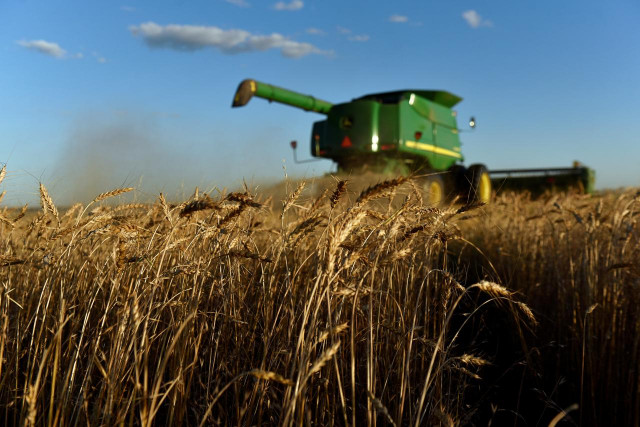Pakistan becomes importer of major agri goods
Due to government’s lack of focus on agronomy, country is now importing wheat and sugar

Pakistan has become a net importer of some of the major agricultural produces from being an exporter about a couple of years ago, as the government’s lack of focus on agronomy is costing the nation a high price for kitchen and textile goods.
“We exported wheat until fiscal year 2018-19 and sugar till last year (FY20),” Sindh Abadgar Board (SAB) Vice President Syed Mahmood Nawaz Shah said while talking to The Express Tribune.
The government has opted to import wheat and sugar in a bid to control the challenging food inflation in the country. The strategy on the other hand has, however, caused widening trade deficit. “The import of agricultural products, including cotton, has narrowed the current account balance in surplus in September,” he said.
The sugar price may drop over the next one to two months after millers start manufacturing the sweetener for the new season. However, the wheat flour price may remain high till next harvesting season for the grain beginning in March 2021, he estimated.
“The little imports of wheat and sugar alone may not help the country in bringing down the prices of commodities, which have shot up this year,” he said.
He said that the wheat output dropped 15-20% nationwide apparently due to climate change in the last season in FY20. “The government, however, did not notice the drop in yield and continued to believe the country produced 25 million tons (which is required to meet local demand in the year),” he added.
“The country has produced wheat somewhere between 22-23 million tons in FY20 against general assumption for 25 million tons,” Shah said, adding, “Due to the wrong assumption, the government (Economic Coordination Committee of the cabinet) did not approve import of wheat in the past few months.”
“In addition to this, the late release of wheat by provincial (Sindh) government from the buffer stock caused the wheat flour price to spike to a high of Rs62 per kilogram in retail these days,” he said.
“We (farmers) are guessing the drop in wheat output is due to climate change (including untimely raining). The actual reasons could be different ones. However, no one (concerned federal and provincial departments) is taking notice of the developments and suggesting possible remedies to farmers,” Shah said.
Shah said the country did not only manufacture record high sugar at seven million tons in FY19 but that was in excess by around two million ton than the nation’s annual requirement for around 5.2 million ton. In the following years (FY20), the production dropped but did not fall below the annual requirement.
“Sugar millers say they have huge stocks of sugar. There is no need for imports. However, the high price of the sweetener in retail led to import of the commodity,” he said.
“Sugar price has almost doubled to Rs110 per kg from Rs52 in a year for no solid reasons, but due to uptrend of the commodity price in international markets,” he said.
State Bank of Pakistan Governor Dr Reza Baqir had earlier said that the food inflation was seasonal and the government would soon overcome the situation like it did last year. The food inflation is due to supply shocks rather than an uptick in demand.
According to the Pakistan Bureau of Statistics (PBS), wheat import increased 100% to $92.29 million in September compared to no imports in the same month of the last year.
Sugar import shot up 5,536% to $12.34 million compared to $219,000. Import of raw cotton soared 2,249% to $88.56 million in September compared to $3.77 million in the same month of the last year.
Published in The Express Tribune, October 27th, 2020.
Like Business on Facebook, follow @TribuneBiz on Twitter to stay informed and join in the conversation.



















COMMENTS
Comments are moderated and generally will be posted if they are on-topic and not abusive.
For more information, please see our Comments FAQ